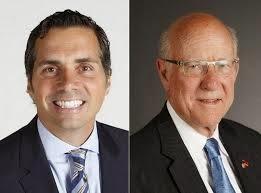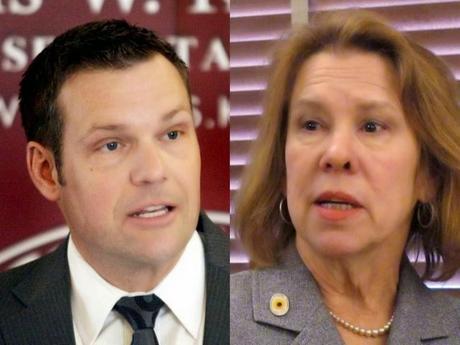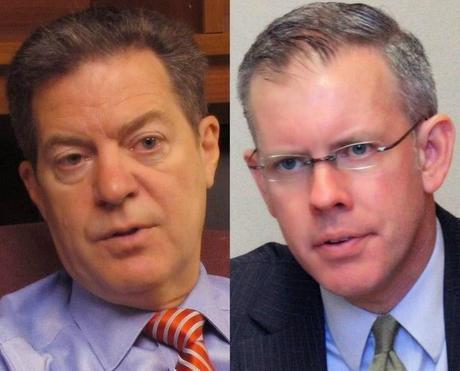Well, I told him my answers, and now I'm telling you. We're exactly 20 days out from Election Day, so this seems like as good as time as any to put my thoughts out there. Maybe I'll revisit these predictions when we're down to 10 days, or 5. But for now, here's what I think about the three main statewide races taking place in Kansas. (Note: obviously I'm leaving lot out here, but honestly there is almost no point in talking about, for example, any of the House district contests, since there essentially no indication that any of our four Republican incumbents are at all threatened, nor any Kansas legislative races, since there is similarly almost no indication that the discontent with the Republicans at the top of the ballot will translate into changes in voting habits--registered Republicans in Kansas outnumber Democrats by almost 2-to-1--further on down. Also, I'm ignoring the Libertarian party candidates. Sorry.)
 Independent newcomer Greg Orman vs. incumbent Republican Senator Pat Roberts. This is the race that, with all the sound and fury which has surrounded it over the past month or so, is to my mind the least likely to change hands. I've thought this from the beginning, and the ups and downs of the polls haven't changed my mind. Roberts has all the advantages of incumbency, of a partisan playing field which favors him, and--most important to my mind, given the high "unfavorable" ratings which leading state Republicans are currently operating under--the ability to tap into a national narrative (STOP HARRY REID AND BARACK OBAMA) which a great many of Republicans, even those of a moderate bent who are deeply frustrated with the direction their party has taken both nationally and here in Kansas, will have a very hard time resisting. Also, don't forget that, as wealthy as Orman is, he can't compete with the funds rolling into Kansas from Americans for Prosperity, the U.S. Chamber of Commerce, and the Republican National Committee--Roberts has been all over the television and the internet of late, while Orman hasn't been nearly as visible. A month ago, the obviously unpopular and basically unimpressive Roberts was 10 points down in the polls against Orman, but now that has closed to within the margin of error, and most (though not all) of the latest polls have him pulling slightly ahead, and I think it's clear that change is almost entirely due to his ability to flood the airwaves with ads that associate Orman, who rates as still unfamiliar with most voters, with the "Obama agenda." Of these three races, the senate race, while it may well be very close, is the one where I'd say, three weeks out, that the Republican incumbent is safest. (Though if
Independent newcomer Greg Orman vs. incumbent Republican Senator Pat Roberts. This is the race that, with all the sound and fury which has surrounded it over the past month or so, is to my mind the least likely to change hands. I've thought this from the beginning, and the ups and downs of the polls haven't changed my mind. Roberts has all the advantages of incumbency, of a partisan playing field which favors him, and--most important to my mind, given the high "unfavorable" ratings which leading state Republicans are currently operating under--the ability to tap into a national narrative (STOP HARRY REID AND BARACK OBAMA) which a great many of Republicans, even those of a moderate bent who are deeply frustrated with the direction their party has taken both nationally and here in Kansas, will have a very hard time resisting. Also, don't forget that, as wealthy as Orman is, he can't compete with the funds rolling into Kansas from Americans for Prosperity, the U.S. Chamber of Commerce, and the Republican National Committee--Roberts has been all over the television and the internet of late, while Orman hasn't been nearly as visible. A month ago, the obviously unpopular and basically unimpressive Roberts was 10 points down in the polls against Orman, but now that has closed to within the margin of error, and most (though not all) of the latest polls have him pulling slightly ahead, and I think it's clear that change is almost entirely due to his ability to flood the airwaves with ads that associate Orman, who rates as still unfamiliar with most voters, with the "Obama agenda." Of these three races, the senate race, while it may well be very close, is the one where I'd say, three weeks out, that the Republican incumbent is safest. (Though if  Incumbent Republican Secretary of State Kris Kobach vs. Republican-turned-Democrat Jean Schodorf. This down-ticket race doesn't receive nearly the attention which the higher profile races do, nor has it really ever been nearly as close or attracted nearly as much outside money (which frankly has been a bit of surprise to many of us watching Kansas politics from the inside), but it is by far, amongst those who pay attention to politics, the most polarizing race in the state. There is essentially no middle ground when it comes to Kobach; either you're not interested enough in political affairs to know what the Kansas Secretary of State has been up to, or you're a huge fan, or you detest the man. (The latter feeling was expressed unprompted by the shopper I spoke to this morning; when mentioned Kobach's name he blurted out "I can't stand that guy.") One might assume that the discontent so many moderate Republicans throughout the state feel for the ideological purity and uncompromising conservative experimentation in Topeka that the past four years has brought us would crystallize around Kobach, but in fact, while some polls have suggested better news, Schodorf has mostly lagged behind. The enormous disparity in their ability to campaign statewide is obviously a factor there (Schodorf is a former state senator who lost in a primary contest to a young Brownback-backed Republican challenger, and thus has never had a state-wide base before); I suspect, though, that the passionate ground game which opponents of Kobach have put together amongst minority and poorer voters is going to make this even closer than the Orman-Roberts race. Still, Kobach is probably going to pull it out, if only because the moderate Republicans which the Democrats need to win this race show little evidence of switching their votes down the ballot, harnessing the courage it takes to change for the big enchilada:
Incumbent Republican Secretary of State Kris Kobach vs. Republican-turned-Democrat Jean Schodorf. This down-ticket race doesn't receive nearly the attention which the higher profile races do, nor has it really ever been nearly as close or attracted nearly as much outside money (which frankly has been a bit of surprise to many of us watching Kansas politics from the inside), but it is by far, amongst those who pay attention to politics, the most polarizing race in the state. There is essentially no middle ground when it comes to Kobach; either you're not interested enough in political affairs to know what the Kansas Secretary of State has been up to, or you're a huge fan, or you detest the man. (The latter feeling was expressed unprompted by the shopper I spoke to this morning; when mentioned Kobach's name he blurted out "I can't stand that guy.") One might assume that the discontent so many moderate Republicans throughout the state feel for the ideological purity and uncompromising conservative experimentation in Topeka that the past four years has brought us would crystallize around Kobach, but in fact, while some polls have suggested better news, Schodorf has mostly lagged behind. The enormous disparity in their ability to campaign statewide is obviously a factor there (Schodorf is a former state senator who lost in a primary contest to a young Brownback-backed Republican challenger, and thus has never had a state-wide base before); I suspect, though, that the passionate ground game which opponents of Kobach have put together amongst minority and poorer voters is going to make this even closer than the Orman-Roberts race. Still, Kobach is probably going to pull it out, if only because the moderate Republicans which the Democrats need to win this race show little evidence of switching their votes down the ballot, harnessing the courage it takes to change for the big enchilada: Incumbent Republican Governor Sam Brownback vs. Democrat state representative Paul Davis. For Kansas voters, and particularly for dissatisfied moderate Kansas Republicans and desperate Kansas Democrats, his is the big one. The polls have shown it to be a tight race ever since Davis announced last year, and Brownback only held a lead in match-up polls during last summer, a lead which only lasted up until Brownback's comparatively embarrassing performance in the Republican party primaries, after which his support crashed, and only in the past week or so has seemed to recover. The very latest polls put it in the margin of error between the two candidates. So why do I think, of these three statewide races, that the governor's race is the one where a Republican incumbent actually may lose in the state of Kansas? Two main reasons. First, because on the basis of the polls and many conversations with insiders it seems pretty clear to me that, however fair or unfair it may be, Governor Brownback is catching the ire of moderate Republicans in a way which Republicans in the state legislature and other state-wide Republican officials are not. Republicans who won't switch for Orman, or for Schodorf, may still be tempted to switch to Davis, if only because the governor, as the chief executive of the state, gets held responsible for all the discontent voters feel for multiple other reasons. And second, because a race this close puts enormous pressure on the few remaining late October insiders--and while the traditional wisdom that says undecideds break for the challenger has itself been challenged, I think that in the case of Kansas in 2014, the very few genuine independent and undecided voters out there will see themselves as potentially having real race-deciding significance, and that will tip them into the challenger's basket.
Incumbent Republican Governor Sam Brownback vs. Democrat state representative Paul Davis. For Kansas voters, and particularly for dissatisfied moderate Kansas Republicans and desperate Kansas Democrats, his is the big one. The polls have shown it to be a tight race ever since Davis announced last year, and Brownback only held a lead in match-up polls during last summer, a lead which only lasted up until Brownback's comparatively embarrassing performance in the Republican party primaries, after which his support crashed, and only in the past week or so has seemed to recover. The very latest polls put it in the margin of error between the two candidates. So why do I think, of these three statewide races, that the governor's race is the one where a Republican incumbent actually may lose in the state of Kansas? Two main reasons. First, because on the basis of the polls and many conversations with insiders it seems pretty clear to me that, however fair or unfair it may be, Governor Brownback is catching the ire of moderate Republicans in a way which Republicans in the state legislature and other state-wide Republican officials are not. Republicans who won't switch for Orman, or for Schodorf, may still be tempted to switch to Davis, if only because the governor, as the chief executive of the state, gets held responsible for all the discontent voters feel for multiple other reasons. And second, because a race this close puts enormous pressure on the few remaining late October insiders--and while the traditional wisdom that says undecideds break for the challenger has itself been challenged, I think that in the case of Kansas in 2014, the very few genuine independent and undecided voters out there will see themselves as potentially having real race-deciding significance, and that will tip them into the challenger's basket.So, my 20-day predictions: Roberts re-elected (narrowly), Kobach re-elected (very narrowly), and Brownback defeated (also narrowly, but not so much as either of the above). Check back in 10 days or so to see if I've changed my mind.
